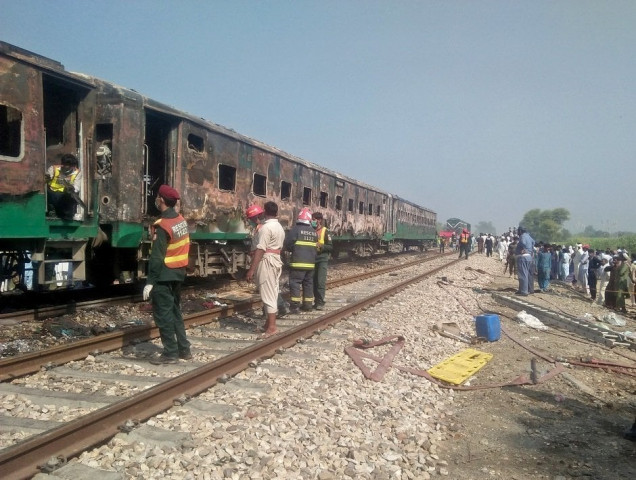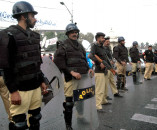Over 100 train passengers dead under PTI watch
Tezgam driver claims short circuit did not cause explosion

PHOTO: Reuters
The maximum number of train accidents, which is 19, occurred in the month of June this year with the heaviest financial losses. Pakistan Railways had to face losses worth millions of rupees.
In the month of August, a total of 26 passengers were killed and 90 injured in the Akbar Bugti train accident near Sadiqabad station. The month of September was another one in which an incident occurred in Karachi Division. On this occasion, a train driver and his assistant died. As a result of the incident, four children, including a girl, were killed at the In Mend Railway crossing near Khaarian.
Keeping in view that just seven days after Minister of Railways Sheikh Rasid took charge, seven compartments of Khushal Khan Khattak train were derailed and 22 passengers were injured.
Tezgam train inferno death toll reaches 74
On Thursday, a train moving to Rawalpindi from Karachi caught fire in three compartments. The incident left 74 passengers dead and more than 40 passengers critically injured. The accident has exposed the inefficiency of the railway administration and the police. Many questions remain unanswered over how passengers were able to carry banned items and the poor management of the luggage search.
Train accidents are increasing by the month owing to the faults of signal systems and derailed track lines. More than 100 passengers have been killed in this year’s accidents, thus far.
A train accident occurred, on May 27, near the Kot Lakhpat station, killing a passenger and injuring two persons. Meanwhile, on June 19, a train collided with a car near Dijkot Railway Station, Rahman Baba, leaving three persons dead.
On June 20, Jinnah Express train hit a train carrying goods near Hyderabad station, killing the driver and his assistant. June 24 marked another dark day when Kohat Express train hit a motorcycle near Fateh Jung Railway Station in Rawalpindi Division, killing the motorcyclist on the spot. On June 29, a motorcycle collided with the Rawalpindi Express train, which left the rider dead. On July 8, Akbar Express train also hit a motorcycle in Sukkur Division, leaving the bike rider dead.
Thursday’s train accident revealed many failures in the country’s railway system. Reportedly, some passengers were carrying banned items along with their luggage in the train compartment. Had the railway administration checked the luggage of all passengers properly, this deadly incident would not have happened.
In pictures: the Tezgam tragedy
After Thursday’s incident, the driver of Tezgam, Muhammad Siddique, told The Express Tribune that the train was stopped around three to four minutes after it caught fire. “As the chain was pulled to stop the train, we found out that many passengers had lost their lives. The tragedy did not happen due to a short circuit.”
He added that after the accident, certain passengers were instructed to not keep cylinders in the train, but they refused to listen.
Tezgam left Rohri at 2:45am and passed the Liaquatpur loop line at 6:00am after which the incident occurred, he further said. “At that time, the speed of the train was not fast and no one had informed me about any short circuit. This kind of fire never ignites from short circuits. The fire erupted suddenly.”
When the train stopped at 6:22am, nearby persons noticed that three compartments were ablaze, he highlighted. The incident happened between Chuni Goth and Liaquatpur and electricity was restored by the time the alarm chain was pulled, he maintained. “After the chain was pulled, the pressure dropped and the automatic brake system was activated, following which the train stopped immediately.”
Siddique further said that the fire did not erupt due to a short circuit and further details will be unveiled after the inquiry. “One cannot make assessments while sitting in the engine room,” he added. “Even after the incident, passengers were adding cylinders inside the train, and they argued with authorities concerned after they were prevented from keeping the cylinders in the train.”
Railways CEO Muhammad Ejaz said that the department’s standard operating procedures are clear. While most accidents involve crossing the railway track by persons in haste, people should cross the tracks very carefully, he added. “Despite the fact that most accidents occur when people are crossing tracks in a hurry, the authorities concerned always keep people informed.”
An official of Pakistan Railways has stated that 10 out of the 74 victims of the Liaquatpur train incident have, so far, been initially identified. DNA has been collected from the rest of the bodies for further identification, the official added.
Published in The Express Tribune, November 2nd, 2019.



















COMMENTS
Comments are moderated and generally will be posted if they are on-topic and not abusive.
For more information, please see our Comments FAQ